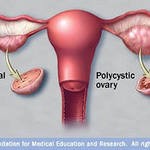POLYCYSTIC OVARY SYNDROME
A syndrome in women characterized by elevated levels of male hormone, absence of ovulation, infertility, and insulin resistance. It is estimated to affect up to 10% of premenopausal women. Polycystic ovary syndrome (PCOS) often causes the body to express male characteristics such as facial or chest hair and male-pattern hair loss, as well as obesity.
Researchers first noted “the diabetes of bearded women” in 1921, since women with PCOS tend to experience significant insulin resistance. About 30% of obese women with PCOS develop glucose intolerance or Type 2 diabetes by age 40. Like people with Type 2 diabetes, women with PCOS appear to have increased susceptibility to cardiovascular disease.





